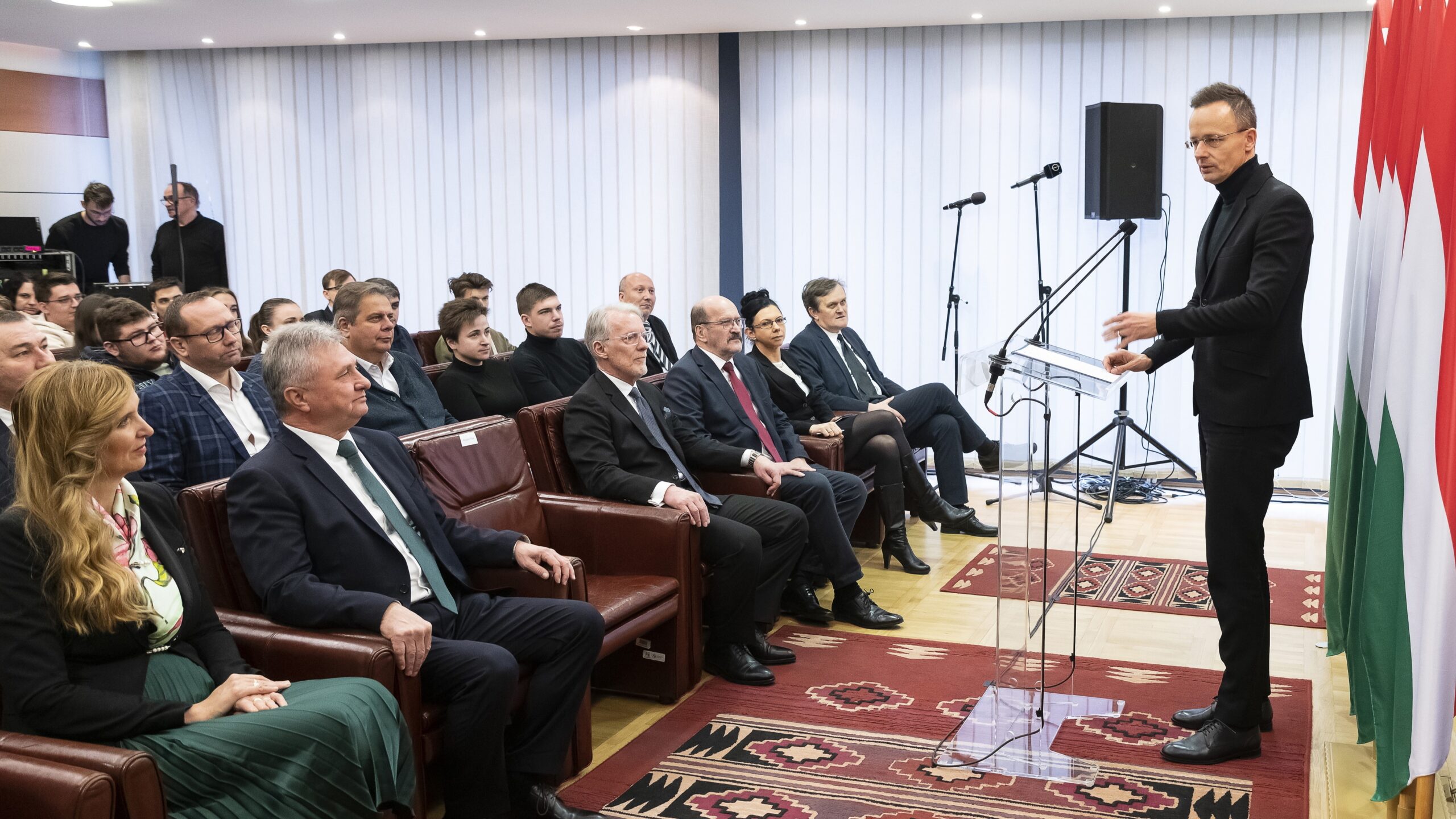Péter Szijjártó emphasized the importance of the Hungarian peace strategy as an opportunity for peace negotiations in the Russo–Ukrainian war in a lecture in Nyíregyháza, a north-eastern Hungarian city located close to the border with Ukraine.
Last Friday Hungarian Minister of Trade and Foreign Affairs Szijjártó Péter gave a lecture at the University of Nyíregyháza about Hungary’s foreign policy strategy, centred around three main aspects: peace, national sovereignty, and economic neutrality.
At the beginning of his presentation Péter Szijjártó reminded that Hungary’s and the nation’s borders do not coincide, and the Hungarian government considers the situation of Hungarians beyond its borders to be a highly important issue.
Péter Szijjártó described the current period as the ‘age of dangers,’ which will be referred to as prominent in the history books of future generations. The minister recalled the crises of recent years, highlighting the Covid pandemic, which had significant effects on the global healthcare system, continuing with the difficulties of the war raging in Hungary’s neighbourhood.
‘The real question now is how to end the war’
In the context of the war in Ukraine, he stated that ‘the real question now is how to end the war’, a war that started more than a thousand days ago. According to him, the most critical question in the conflict are ‘How can we achieve peace? What is the shortest, fastest path to peace?’
Later in his lecture, he described the strategy followed by Europe with regard to the war as consisting of two main elements: sanctions against Russia and weapons for Ukraine. He remarked that these measures should be evaluated in the light of their purposes. ‘The sanctions against Russia had a dual purpose. On the one hand, they wanted to force Russia to end the war, thus bringing peace as soon as possible, and on the other hand, the aim was to bring the Russian economy to its knees. These sanctions did not enhance peace,’ said Szijjártó. He continued by remarking that the sanctions were rather counter-productive and ‘the European economy was given a regular shot in the knee, stomach, and then the lungs.’
According to the minister the goal regarding the war in Ukraine should be a peace strategy to have a ceasefire as soon as possible. ‘The West seems willing to fight until the last Ukrainian youth with the possibility of lowering the conscription age’, he stressed, adding that this approach puts the Ukrainian nations’ future at risk.
He stated that Hungary is committed to peace and keeps its diplomatic and communication channels open so that possible misunderstandings cannot cause a global tragedy.
Related to the other pillar of the Hungarian foreign strategy, national sovereignty, Szijjártó stated that a pro-migration establishment in Brussels is dangerous for Europe and human lives. As opposed to the EU’s current approach, economic neutrality is the third pillar of Hungary’s strategy; the minister underscored that Hungary cannot live in a world divided into blocs. ‘We are working to develop civilized cooperation between East and West,’ he highlighted.
‘A world divided into blocs is not beneficial for Hungary’
‘We are a country that creates opportunities for the safe cooperation of Eastern and Western economic interests. This is especially important today when world politics has again shifted in a direction that aims to form global blocs. A world divided into blocs is not beneficial for Hungary—in fact, it is clearly contrary to our national interests,’ Szijjártó nailed down.
He elaborated that Hungarians who were already adults before the regime change know very well what consequences such a division has. ‘In the world before the 1990s, Hungary lost 40 years. This period brought dictatorship, Eastern oppression and Western negligence. A world divided into blocs has always caused damage to our country—and it would be no different today. That is why we in Hungary are advocates of connections and cooperation,’ added the minister. ‘For a country where the backbone of the economy is exports—since they account for 75-85 per cent of GDP—a world burdened with restrictions and strict blocs would have terrible consequences. We are working to develop civilized cooperation between East and West, and we are doing this not for ideological but for practical reasons,’ Péter Szijjártó stated. According to the minister, the only beneficial way for Hungary is to trade with both East and West and to attract investments from both directions.
He concluded his lecture reiterating that peace, national sovereignty, and economic neutrality are the three objectives that determine Hungarian foreign policy today.







